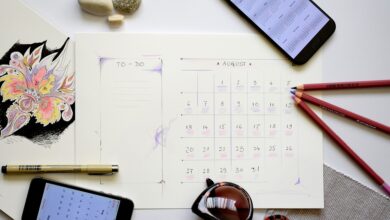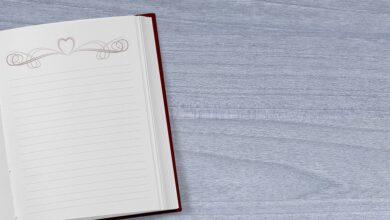
From Chaos to Calm: How a Calendar Can Help You Find Balance
In our fast-paced world, where demands and distractions seem to multiply daily, finding balance can often feel like an elusive dream. With endless obligations, both personal and professional, the chaos can be overwhelming. However, one deceptively simple tool can help you navigate this tumultuous landscape: the calendar. While many may view a calendar merely as a scheduling tool, it can become a powerful ally in your quest for balance, transforming chaos into calm.
The Importance of Structure
One of the primary reasons people struggle with balance is the lack of structure in their lives. Without a clear sense of what needs to be done and when, it’s all too easy to lose control. Structure provides a framework within which individuals can organise their thoughts and actions. A calendar can serve as a visual representation of your commitments and priorities, enabling you to see your life in a more orderly fashion.
When you use a calendar, you create a dedicated space for your tasks, appointments, and responsibilities. This not only helps to alleviate feelings of overwhelm but also allows you to allocate your time judiciously. By placing your commitments on a calendar, you can avoid overloading yourself and identify periods of free time to relax or engage in leisure activities.
Setting Priorities
Effective time management begins with understanding your priorities. A calendar provides a unique opportunity to clarify what matters most in your life. The act of writing down your commitments forces you to evaluate their importance and relevance. This process helps you distinguish between what is urgent and what is truly significant.
Consider using different colours or symbols on your calendar to categorise tasks by priority. For instance, you might use red for urgent deadlines, green for personal commitments, and blue for professional obligations. This visual representation allows you to quickly assess your day and prioritise tasks accordingly. By doing so, you can direct your energy towards the activities that align with your core values and long-term goals, ultimately fostering a sense of fulfilment.
Time Blocking for Productivity
One effective method for using a calendar to enhance productivity is time blocking. This technique involves creating designated time slots for specific tasks or activities, allowing you to focus intensely on one thing at a time. By blocking off time in your calendar, you eliminate the temptation to multitask, which can often lead to reduced efficiency and increased stress.
When implementing time blocking, be realistic about how much you can achieve in each segment. Aim to allocate time not just for work-related tasks but also for personal activities, such as exercise, relaxation, and socialising. This balanced allocation prevents burnout and promotes overall well-being.
Remember to include breaks in your schedule as well. These pauses are essential for mental rejuvenation and can enhance your productivity when you return to your tasks. By managing your calendar effectively with time blocking, you’ll find yourself achieving more while feeling calmer and more in control.
Cultivating Mindfulness with a Calendar
Incorporating mindfulness into your daily routine is another powerful way to transform chaos into calm. Mindfulness is all about being present in the moment and fully engaging with your experiences. Using a calendar to schedule time for mindfulness practices, such as meditation or deep-breathing exercises, can profoundly impact your mental well-being.
Set aside specific times in your calendar for these activities, just as you would for any other commitment. Treating mindfulness as a non-negotiable part of your schedule reinforces its importance in your life. You might find that these moments of stillness help you mentally reset, allowing you to approach challenges with greater clarity and composure.
Review and Reflection
An often-overlooked aspect of effective calendar management is the importance of review and reflection. Setting aside time each week to evaluate how you’ve spent your time can offer valuable insights into your patterns and habits. Did you overcommit, or perhaps neglect self-care? Are there particular activities that consistently make you feel rushed or stressed?
By regularly assessing your calendar, you can learn to identify what works well and what doesn’t. Consider keeping a journal alongside your calendar to jot down your thoughts and feelings about your week. This practice of reflection can illuminate areas that require adjustment and help you stay aligned with your goals.
The Role of Technology
In our increasingly digital world, many individuals rely on electronic calendars. Apps such as Google Calendar, Outlook, or Notion offer convenient features that can help streamline your scheduling process. Digital calendars often come with reminders, integration capabilities, and sharing options, making them an excellent choice for those who juggle multiple responsibilities.
However, the key to effective calendar use—regardless of whether it’s physical or digital—remains the same: consistency. Develop a habit of regularly updating your calendar and checking it at the start or end of each day. Just as a musician needs to practice daily to hone their craft, cultivating a routine around calendar management will help you find your bearings in life’s busy rhythm.
Balancing Work and Personal Life
For many, the struggle for balance is exacerbated by the demands of work and home life. A well-structured calendar can assist you in delineating the line between professional and personal obligations. By explicitly noting work hours and personal events, you can protect your time and ensure you dedicate enough energy to both spheres.
In addition, consider incorporating time for family, hobbies, and self-care into your calendar. Designate evenings or weekends for personal time, ensuring you’re not tempted to work during these periods. This practice fosters healthy boundaries, allowing you to recharge and maintain enthusiasm in both your personal and professional lives.
Finding Joy in Routine
A calendar not only acts as a tool for organisation but can also help you recognise and celebrate routine joys. Amidst the hustle and bustle, it’s easy to lose sight of the simple pleasures that enrich our lives. By scheduling regular activities that bring you joy—be it time with friends, reading a book, or indulging in a hobby—you create opportunities for happiness within your busy life.
Make it a point to plan these enjoyable activities in advance, ensuring they have a reserved spot in your calendar. In doing so, you’re affirming the importance of joy and self-care, reminding yourself that balance is not just about managing obligations but also indulging in experiences that nourish your soul.
Conclusion
In a world that often appears chaotic, a calendar can be your beacon of stability and tranquillity. By providing structure, clarifying priorities, promoting productivity, and scheduling mindfulness, it paves the way for a balanced life.
Moreover, the act of regularly reviewing your commitments fosters reflection, allowing you to continually align your life with your values and aspirations. Whether through a traditional planner or a digital application, your calendar is more than just a tool; it’s a roadmap guiding you from chaos to calm.
Embrace this opportunity to take charge of your time and cultivate a sense of balance. By consciously planning your days, you’ll discover that amidst life’s demands, you can create a fulfilling and harmonious existence.



